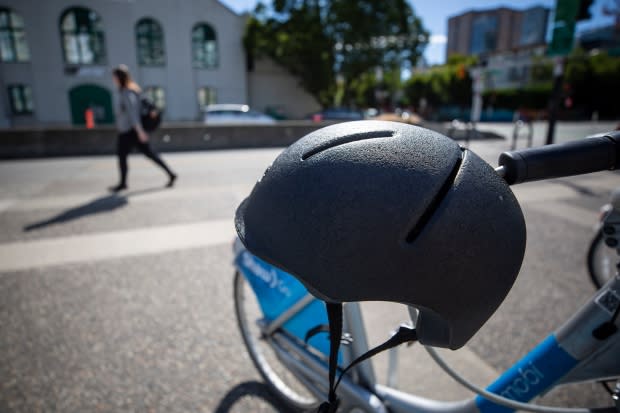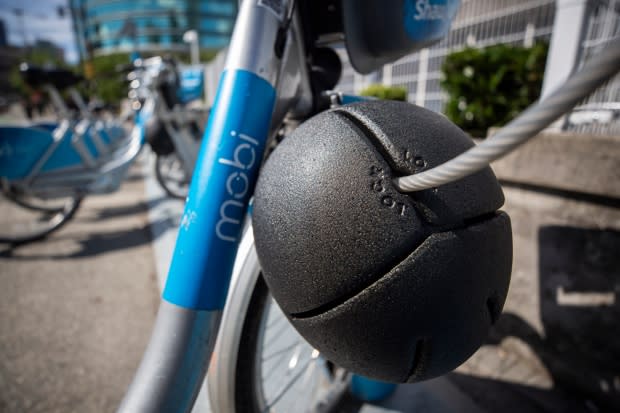Mobi introduces new bike helmets amid loss and theft
Vancouver's bike-share program, Mobi, has introduced new helmets following complaints that previous helmets were often stolen or lost.
Bell Helmets, a California-based manufacturer, designed the new helmets, which are made of a light-weight foam material and come with a more secure locking system.
While there are many helmet brands to choose from, ride-share users can't pick a helmet that's tailor-made to their preferences. Rather, they have to use what's offered by the bike share.
Andrea Pankow, category director of Bell Helmets, said the new helmet checks all the boxes of protective gear that's specifically designed for a ride sharing system.
"We've come up with a helmet that is able to serve multiple people of all different sizes and ages riding this bike," said Pankow. "At this moment, this is the best solution we have out there."
The new helmets also have a more secure locking system, which officials from Mobi and Bell Helmets hope will thwart theft.
Riders have to thread a cable through a hole in the top of helmet and secure it to the bike. The old helmets would be loosely hung off the bike by their straps, which were easily cut into, said Pankow.
The new helmets arrived last month and are gradually being stocked at the 192 Mobi stations across the city. Under law, cyclists in British Columbia are required to wear helmets.

Too big to fit?
Mobi is Vancouver's official bike-share program and part of the city's vision to make cycling a sustainable alternative to car use. Over 125,000 users have registered with the service since its launch in summer of 2016.
But the new helmets, which look and feel different than typical multi-sport helmets, have sparked some criticism. Some users say they look cheaply made. Others say they are too large.
The manufacturer has scrapped the outer plastic plastic shell and the inner foam padding. They're made of expanded polypropylene (EPP), a light-weight foam material that the company says reduces the use of plastic.

Tom Wagener, a frequent Mobi user, said the new helmets aren't as comfortable, and are too big for people with smaller heads.
But Wagener said they're an improvement because he spots more helmets at Mobi stations than he did before. "The new ones are definitely cheaply made. I'm guessing that'll make them easy to replace," said Wagener, who's taken to Twitter in the past to complain about missing helmets.
Serving a different purpose
Does that mean the new helmets are unsafe? Not according to Pankow, who said the new helmets — which are the result of three years of research and design — are manufactured specifically for a bike-share service. "You have to look at the [new] helmet as it's serving a different purpose. It's for bike share, it's for the community, it's for being rentable and used by the masses," said Pankow.
Ride-share helmets spend more time outdoors in the heat or rain. Pankow said the foam surface is easier to clean and it withstands more wear and tear than a plastic shell.
Pankow said the new helmets are as safe as the previous models, noting all new helmets have to pass safety standards.
Mobi's new helmets comply with the American Society for Testing and Materials standard (ASTM) — which is one of the standards laid out by the B.C. Motor Vehicle Act for protective headgear.


